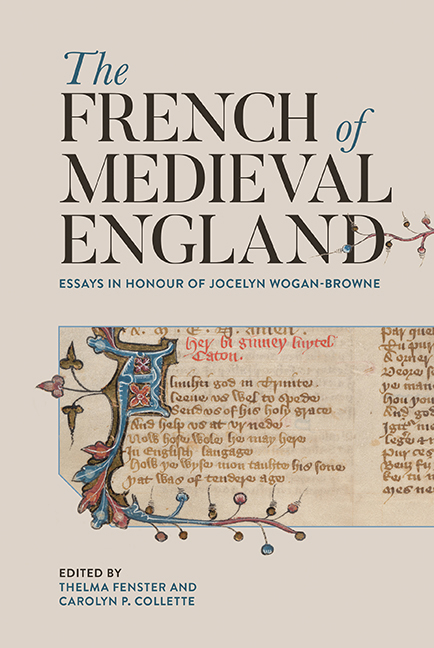Book contents
- Frontmatter
- Contents
- List of Illustrations
- List of Contributors
- List of Abbreviations
- Foreword: ‘The Light I Never Left Behind’: Jocelyn Wogan-Browne
- Introduction: Recognizing the French of Medieval England
- 1 The Gloss to Philippe de Thaon's Comput and the French of England's Beginnings
- 2 The Scandals of Medieval Translation: Thinking Difference in Francophone Texts and Manuscripts
- 3 Contrafacture and Translation: The Prisoner's Lament
- 4 Complaining about the King in French in Thomas Wright's Political Songs of England
- 5 The Chanson d’Aspremont in Bodmer 11 and Plantagenet Propaganda
- 6 The Use of Anglo-Norman in Day-to-Day Communication during the Anglo-Scottish Wars (1295–1314)
- 7 Middle English Borrowing from French: Nouns and Verbs of Interpersonal Cognition in the Early South English Legendary
- 8 William Langland Reads Robert Grosseteste
- 9 Disability Networks in the Campsey Manuscript
- 10 English Women and Their French Books: Teaching about the Jews in Medieval England
- 11 French Residents in England at the Start of the Hundred Years War: Learning English, Speaking English and Becoming English in 1346
- 12 French Immigrants and the French Language in Late-Medieval England
- 13 Fashioning a Useable Linguistic Past: The French of Medieval England and the Invention of a National Vernacular in Early Modern France
- 14 Admiring Ambivalence: on Paul Meyer's Anglo-Norman Scholarship
- 15 Twenty-First Century Gower: The Theology of Marriage in John Gower's Traitié and the Turn toward French
- 16 Royaumes sans frontières: The Place of England in the Long Twelfth Century
- Afterword
- Bibliography
- Index
- Publications of Jocelyn Wogan-Browne
- Tabula Gratulatoria
Foreword: ‘The Light I Never Left Behind’: Jocelyn Wogan-Browne
Published online by Cambridge University Press: 12 August 2020
- Frontmatter
- Contents
- List of Illustrations
- List of Contributors
- List of Abbreviations
- Foreword: ‘The Light I Never Left Behind’: Jocelyn Wogan-Browne
- Introduction: Recognizing the French of Medieval England
- 1 The Gloss to Philippe de Thaon's Comput and the French of England's Beginnings
- 2 The Scandals of Medieval Translation: Thinking Difference in Francophone Texts and Manuscripts
- 3 Contrafacture and Translation: The Prisoner's Lament
- 4 Complaining about the King in French in Thomas Wright's Political Songs of England
- 5 The Chanson d’Aspremont in Bodmer 11 and Plantagenet Propaganda
- 6 The Use of Anglo-Norman in Day-to-Day Communication during the Anglo-Scottish Wars (1295–1314)
- 7 Middle English Borrowing from French: Nouns and Verbs of Interpersonal Cognition in the Early South English Legendary
- 8 William Langland Reads Robert Grosseteste
- 9 Disability Networks in the Campsey Manuscript
- 10 English Women and Their French Books: Teaching about the Jews in Medieval England
- 11 French Residents in England at the Start of the Hundred Years War: Learning English, Speaking English and Becoming English in 1346
- 12 French Immigrants and the French Language in Late-Medieval England
- 13 Fashioning a Useable Linguistic Past: The French of Medieval England and the Invention of a National Vernacular in Early Modern France
- 14 Admiring Ambivalence: on Paul Meyer's Anglo-Norman Scholarship
- 15 Twenty-First Century Gower: The Theology of Marriage in John Gower's Traitié and the Turn toward French
- 16 Royaumes sans frontières: The Place of England in the Long Twelfth Century
- Afterword
- Bibliography
- Index
- Publications of Jocelyn Wogan-Browne
- Tabula Gratulatoria
Summary
In asking where Jocelyn Wogan-Browne's interest in the interrelation of differing languages began, we might start with a small Australian girl on roller skates gliding (because how can we imagine Jocelyn otherwise?) along the pavement in a Melbourne suburb, singing out ‘Buongiorno!’ to an Italian neighbour and then being mortified when he replied because – already voluble, no doubt – she had reached the limits of her vocabulary. Or with the child who longed to go to high school and learn French, wondering if the French alphabet also began with ABC – or was it perhaps DEF? – and who, when she finally found out, was pelted with pebbles by the other children for of course getting 100% in the French exam. Or later winning a scholarship to a private school where she could learn Latin and German in addition to French. Or, when she got to the Melbourne University English department, encountering Old Norse, taught by Ian Maxwell, who was as charismatic a lecturer as she herself would become in her turn. Or, after graduating in English as the top student of her year, using her spare time to learn Greek while teaching in order to pay off her student loans (Italian had to wait another twenty years or so). No doubt her Greek accent is as impeccable as all the rest. Jocelyn's fascination with other languages must have been underpinned by what was, in the 1950s and beyond, a peculiarly antipodean nostalgia for Europe, for poems about May reverdies that you had never seen and birdsong that you had never heard. Ignoring the place-names of the Melbourne area – Moorabbin, Ivanhoe, Heidelberg West – she remembers poring over maps of England as a child and asking herself how a place like Ashby de la Zouch could ever have got its peculiarly hybrid name: a uniquely Wogan-Browne variant of what Australians used to call the ‘colonial cringe’.
Jocelyn's origins are not simply English, though, but European: her mother’s family had come to Australia from Germany (her scientist grandfather was a native German speaker) and her father's from Ireland. Donald Wogan-Browne was a commander in the Royal Australian Navy and was often away; when he left the service, around the time Jocelyn started at Melbourne University, he and Jocelyn's mother, Geraldine, took up dairy farming.
- Type
- Chapter
- Information
- The French of Medieval EnglandEssays in Honour of Jocelyn Wogan-Browne, pp. xiii - xviiiPublisher: Boydell & BrewerPrint publication year: 2017

